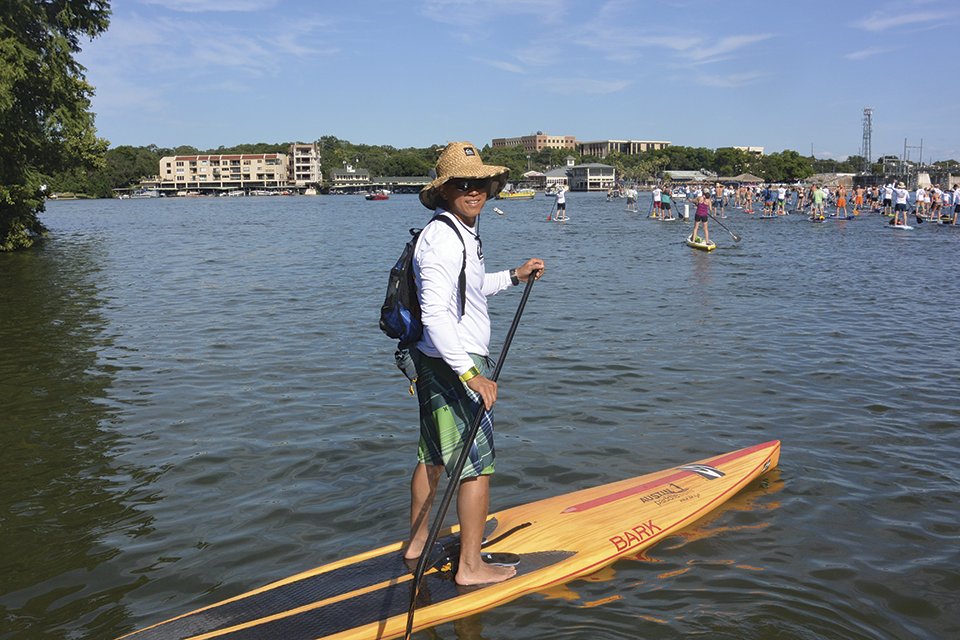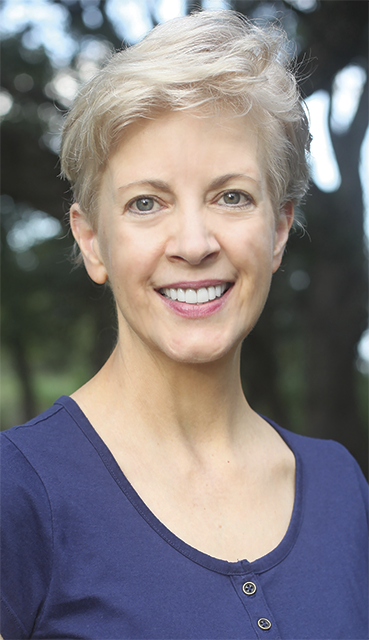Austin Fit Physicians

“An apple a day keeps the doctor away,” so we were told as young children. There’s certainly something to be said for maintaining a healthy lifestyle and keeping our unexpected doctor visits to a minimum. However, next time you’re out there on the lake, in the gym, or on the trails, you just may find some of Austin’s finest physicians right next to you. We are fortunate to live in a city where so many physicians really do practice what they preach. Here are a few of Austin’s fit physicians.
Peter Ching, M.D.
Board Certified in General Surgery
What inspired or motivated you to pursue medicine and your specialty? Both of my parents were physicians, so it was always assumed I would do medicine. Fortunately, as it turns out, I really liked it, so I’ve had no regrets!
I was originally going to do heart surgery, but my wife got a job back here in Austin at the University of Texas. We had a deal that if she got that job, I would come to Austin for general surgery, but if she didn’t get the job, she would then follow me for another three years of fellowship for cardiology. It ended up being a great idea and general surgery is much more fun than I thought it would be. We moved back to Austin in 2004 and I’ve been practicing since 2005.
What type of patients do you see?
We mainly see adult patients and most of the work I do is typically acute surgeries like emergency gall bladders, appendicitis, hernias. My elective cases are similar, but also include surgeries like tumors, colon cancers, breast cancer surgeries and the like.
What is the most rewarding aspect of your job?
I love the gratification and satisfaction that I’m helping my patients become better than they were before, whether it’s an emergency procedure or even a scheduled surgery. Generally, with the things we’re treating (like appendicitis or gall bladders), we’re usually able to “fix” the problem and send them home. Hopefully, they never have to return with the same issues, because we’ve taken care of them properly.
What are some of your hobbies and activities that help you remain active?
In high school and college (at the University of Texas), cycling was my main sport and I did a lot of collegiate racing on the club cycling team. I also learned how to windsurf out on Lake Travis and we were out at Windy Point every day for about three years. It was awesome!
In medical school (University of Texas Southwestern Medical Center in Dallas), windsurfing and some mountain biking were my primary sports and then in residency (Minneapolis), I mostly ran. Since returning to Austin, paddleboarding has become my primary sport, and I’ll go for an occasional run if I want to rest my upper body. Up until this year, I was racing paddleboards regularly and I always do the annual Dam That Cancer 21-mile event.
Why is it important for you to practice what you preach?
Most importantly, I want to set a good example for my patients, especially if I’m the one telling them to move, quit smoking, or lose weight before and after surgery. Becoming or staying active can go a long way in post-operative recovery.
Second, because our job can be physically demanding, it almost requires that I stay in shape. When I’m standing on my feet for 10 hours a day, running around the hospital, or even working for 24-hours nonstop, there is a physical and emotional advantage to being fit.
Finally, the mental benefit is also a huge part. I love paddling, especially in the morning after a rain. It’s so relaxing and meditative that I almost fall asleep out there. Plus, there’s a physiological aspect to paddling which is different from a lot of other sports. You’re balancing, stabilizing, and working all your muscles while the board is moving. It’s very technique oriented, which means there’s always room for improvement.
 Linda Carney, M.D.
Linda Carney, M.D.
Board-Certified by ABEM, General Family Practice in Buda
What inspired or motivated you to pursue medicine and your specialty?
I am board-certified by ABEM in emergency medicine because it has allowed me to embrace an active lifestyle since my youth. My mom is a registered nurse, and when I was nine years old, she married my vegetarian step-dad (who turned me vegetarian). Because my parents worked in our town’s hospital, I started working part-time in the hospital at age 15. I peeked into the autopsy suite one day, was invited in to watch(!), saw the pathologist cutting into the heart and brain of a cadaver, and became intrigued with the idea of becoming a physician.
This is my 31st year practicing since medical school. My husband, Sean, and I moved to the Austin area in 2005 from Northern California, where I had been practicing medicine at Palo Alto Medical Foundation.
What type of patients do you see?
I see children from age two and up, as well as men and women of all ages. The most exciting part of my practice is that I accept most insurances, which is very rare in wellness practices like mine. I offer office gynecology as well as dermatology consults, and I specialize in helping patients who are difficult to diagnose. My practice is dedicated to finding the cause of the symptoms, and empowering people to remove that cause to promote natural healing.
What is the most rewarding aspect of your job?
When patients realize that exercise and plant-based diets can empower them to take their health into their own hands, I feel that I am living up to my calling. I love opening the eyes of people at their teachable moment, such as upon receiving a new diagnosis of cancer or psoriasis. It is then that they are most open to considering change. I am humbled and honored to now have more to offer them than ill, pill, and bill. I’m incredibly rewarded to see the disease reversal that happens right before my very eyes, month after month, from changes in lifestyle.
I also enjoy helping people lower their cholesterol levels without medication. My hypertensive patients can experience such a turnaround that they no longer need pills for blood pressure. My acne patients get off their medications and see their skin clear up beautifully. My young athletic patients learn how to boost their sports performance by eating beans, greens, squash, and yams for breakfast, with oats and fruit for dinner. Most people wish they did not have to take medications for cholesterol or diabetes, so I love helping them turn that wish into a reality. It’s exciting to see vision improve for diabetics, and to see pain resolve for people with arthritis. I love helping people to find more energy so that they can live an active lifestyle and participate in the sports they enjoy.
What are some of your hobbies and activities that help you remain active?
My treadmill computer and my workouts at the YMCA keep me happy and energized. Stretching daily started long before my college gymnastics team toured Europe and Scandinavia when I was a teen. I still love core-strength workouts at home, and am grateful whenever I can get away for play sessions in non-competitive sports like windsurfing and snowboarding. Snowshoes, cross-country skis, scuba equipment, and my mountain bike still call to me from our garage. Sean and I formed a hiking group the first year we married, and we still love walking, camping, snorkeling, and goofing around on stand-up paddleboards with our daughter, son-in-law, and grandchild. Our garden work is rewarding in several ways—it’s fun to plant, water, harvest, and eat. I enjoy working out in the old-school heavy-duty style at BoneBreaker Barbell in South Austin, where I’ve learned amazing fitness tips from Mike Crockett and the owner, Gina Kunda.
Why is it important for you to practice what you preach?
I like to keep it real, so I ask patients to do as I do, not just as I say. People are searching for more health with less medicines. Patients are encouraged to try adopting an active lifestyle and new plant-based recipes for themselves (despite their busy schedules) when they see that an active, plant-based lifestyle is doable—even by a busy, working grandmother like me.
Edward Chafizadeh, M.D. .jpeg)
Cardiologist
What inspired or motivated you to pursue medicine and your specialty?
Both of my parents are Doctors so that definitely influenced my decision as early as my teenage years. I actually used to spend a lot of time rounding with my Dad and going into the operating room with him and I loved it! Ultimately, Cardiology excited me because of the adrenaline aspect. There’s something new every day and taking care of people who are having heart attacks, life-threatening arrhythmias, and the like, has always been exciting for me.
What type of patients do you see?
I literally see people from their 20s to their 90s. In general, it tends to be older people since chronic disease tends to catch up with people as they age, so the average patient I see is usually between 65-70. A lot of problems stem, not just from bad lifestyles, but from our standard lifestyle. We’re exposed to pollution all the time and it’s hard to avoid fast food and over-portioning of food. Unless you are super spartan or super careful, there’s always a likelihood of being in harm’s way, especially if you’ve got bad genes.
I do advise on diet and lifestyle daily because, unfortunately, a lot of these diseases are also self-induced. Most people’s diets are terrible, so I often use the “shop in the outside aisles of the grocery store” concept, which is to encourage them to increase their consumption of real foods like fresh fruit and produce. Avoid the processed processed foods and the things that are in packages and boxes. One of my all-time favorite quotes is from fitness guru, Jack LaLanne. Someone asked him the secret to his long livelihood and he said, “If man makes it, I don’t eat it.” If it’s natural, it’s ok. If it’s processed, try to avoid it.
What is the most rewarding aspect of your job?
The most rewarding aspect of my job is the acute save, if you will. People come in with an emergency and we’re able to save them. There’s certainly not much more rewarding than that.
In the long term, it’s also extremely rewarding getting to know my patients over an extended period of time and seeing their disease process improve because of things that we’ve done. It could be through dietary counseling, exercise programs, getting them to quit smoking, or even getting them on the appropriate medications. If people are willing to change, good things can happen.
What are some of your hobbies and activities that help you remain active?
I absolutely need to exercise for my mental health. If I don’t work out, I feel miserable. I do Orangetheory classes a lot, ride an exercise bike, run Town Lake some, and play golf. My daughter has recently gotten the triathlon bug, so we’ll hopefully do some Splash-n-Dash races this year and a sprint triathlon together at the end of the summer. In the winter, I also enjoy skiing.
Why is it important for you to practice what you preach?
I had a patient once tell me that they switched Doctors because the physician wasn’t healthy, so it’s important because I don’t want to be hypocritical to my patients. I just can’t tell them to do something and then not do it myself. No one is perfect all the time, but it’s extremely important for me to be as healthy as I can for my own sake and to instill a level of confidence in my patients.






